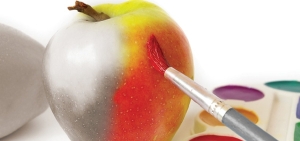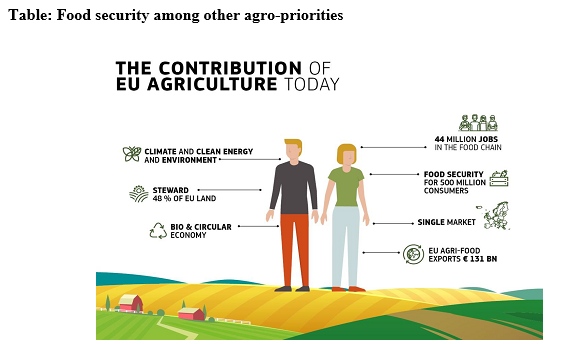Analytics, EU – Baltic States, Legislation, Markets and Companies, Modern EU
International Internet Magazine. Baltic States news & analytics
Friday, 26.04.2024, 17:19
Food quality needs additional attention from the EU institutions
 Print version
Print version |
|---|
Concerns about food fraud and food quality undermine
consumer confidence and damage the whole food supply chain in Europe, from
farmers to retailers. Recent cases of food fraud included olive oil, wine,
honey, fish, dairy products, meat and poultry. In addition, consumers may be
exposed to unfair commercial marketing practices, especially regarding food
products with significant differences in composition offered in different
markets but under a similar package.
The established “knowledge center” is a network made up of
experts in and outside the Commission; it will support EU policymakers and the
member states’ authorities by providing access to, and sharing up-to-date
scientific knowledge on food fraud and food quality issues. Tibor Navracsics,
Commissioner for Education, Culture, Youth and Sport, is responsible for the
Joint Research Centre, which administers the new “Knowledge Centre for Food
Fraud and Quality”; the center is situated in Strasbourg.
European Commissioners are unanimous of the center’s
importance: thus, Commissioner Navracsics underlined that food was the sphere where
science could “directly and tangibly” demonstrate the benefits to citizens. And
because food fraud is a transnational criminal activity, the EU has a role to
play; hence the launch of the “knowledge center”, he argued, has been an
important step to protect the integrity of the EU food chain and safeguard the
quality of food products, generating a clear added-value for Europeans.
His colleague, Commissioner Jourová added
that the Commission
had already taken a number of concrete steps to tackle the issue. Thus, providing
better scientific evidence on food quality (with newly created knowledge
center) would bring together experts and knowledge from different locations, while
further contributing to collecting and processing science-based evidence. Besides,
she argued, the center’s work would also contribute to developing a common
testing methodology, which in turn would help apply and enforce food and
consumer protection laws.
Quality schemes
In
the EU member states there is a special agro-program (CAP’s program) called “Quality
schemes through quality policy”. It provides a number of measures to help
producers build on the high quality reputation of European products to sustain
competitiveness and profitability.
A
key tool in this approach is the register of European quality products, which
includes more than 1 300 protected food
names which are classified in 3 categories:
-
Protected
Designation of Origin (PDO),
-
Protected Geographical Indication (PGI),
and
- Traditional
Speciality Guaranteed (TSG).
The
production of these “registered quality products” contributes to diversity,
development and growth in the rural areas where they are produced and protects
local knowledge, skills and jobs.
For
example, presently, France has 233 food
products registered, of which 98 as
PDO (such as Roquefort or Beurre d'Isigny), 134 as PGI (such as Saint-Marcellin, Sel de Guérande/ Fleur de sel
de Guérande or Melon de Guadeloupe) and one
as TSG (Moules de Bouchot).
The knowledge center’s competences
- coordinate market surveillance activities, for example on
the composition and sensory properties of food offered under the same packaging
and branding on several markets across the EU;
- operate an early warning and information system for food
fraud, for instance through media monitoring and providing this information to
the general public;
- link information systems of Member States and the
Commission, such as databases describing the composition of certain high value agro-food
products such as wine or olive oil;
generate country-specific knowledge; for example by mapping
the competencies and laboratory infrastructures in the member states.
The Knowledge Centre for Food Fraud and Quality will
produce newsletters, interactive maps, databases and regular reports and will
make this information publicly accessible. The Knowledge Centre will be fully
funded by the European Commission.
The size of different expert groups will depend on the
subject of its work. The Knowledge Centre will complement the EU Food Fraud
Network by providing an interface between science and policy-making.
Alongside the launch of the knowledge center, there was an
exhibition "Putting Science at the Heart of European Policymaking" at
the European Parliament in Strasbourg, which charts the work and history of the
Joint Research Centre since its creation in 1957.
The Joint Research Centre has long-standing expertise in
food science including authenticity research and expertise in developing,
applying and validating analytical test methods to detect fraud in the food
chain.
EU legislative background for food quality
The food chain in the European Union is legislated by
several legal acts. Among most important are:
= the General Food
Law: Regulation (EC) No 178/2002 of the European
Parliament & the Council of 28 January2002 laying down the general
principles and requirements of food law, establishing the European Food Safety
Authority and laying down procedures in matters of food safety.
= the Food
Information to Consumers legislation: Regulation
(EU) No 1169/2011 of the Parliament and the Council of 25 October 2011 on the
provision of food information to consumers. = Unfair Commercial Practice
directive: Directive 2005/29/EC of the European
Parliament and of the Council of 11 May 2005 concerning unfair
business-to-consumer commercial practices in the internal market.
These legislations require producers’ compliance of certain
compositional and quality standards of agricultural products.
The Knowledge Centre for Food Fraud and Quality is the
fifth to be launched after the ones on Bioeconomy,
in https://biobs.jrc.ec.europa.eu/
and EU bio-economy strategy (from 2012) in:
http://ec.europa.eu/info/law/better-regulation/initiatives/ares-2018-975361_en
Territorial Policies, in:
https://ec.europa.eu/jrc/en/territorial-policies
Migration and Demography,
in: https://ec.europa.eu/jrc/en/migration-and-demography,
and
Disaster Risk Management,
in: http://drmkc.jrc.ec.europa.eu/
.

More information in: =Knowledge Centres of the Joint Research Centre; =The Joint Research Centre. EU policy-making based on facts (PDF).
General reference: http://europa.eu/rapid/press-release_IP-18-1744_en.htm/12.03.2018;
Latvian version: http://europa.eu/rapid/press-release_IP-18-1744_lv.htm
Farmers’
income is still lagging behind salaries in other sectors and whole economy.
Source: DG AGRI based on DG AGRI and Eurostat data,
2011-2013
Average CAP
support: operating
subsidies per worker incl. support covering possible negative market income. More
on the European agricultural issues in: Commission Work
Programme 2018 – An agenda for a more united, stronger and more democratic
Europe, COM (2017)650 final of 24.10.2017.
Source:
https://www.eumonitor.eu/9353000/1/j9vvik7m1c3gyxp/vkiqnh38o5zz








 «The Baltic Course» Is Sold and Stays in Business!
«The Baltic Course» Is Sold and Stays in Business!

